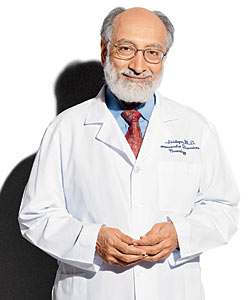
DIAGNOSING ALS’S CAUSE
Last summer, the Feinberg School of Medicine at Northwestern University announced that its researchers had uncovered a common cause for the various forms of amyotrophic lateral sclerosis (ALS, or Lou Gehrig’s disease). That dramatic breakthrough could lead to revolutionary new therapies to treat the fatal neurodegenerative disorder.
Leading the team of scientists was Teepu Siddique, the 64-year-old neurologist who has devoted much of his adult life to trying to understand and cure the illness. “ALS has a very tragic outcome,” he says. “It’s like being jailed in your own body. It’s an example of the overall human condition of futility and helplessness. That is the philosophic and humanistic underpinning of my interest in this disease.”
The researchers’ great discovery was a protein—ubiquilin 2—that recycles other damaged proteins in the neurons of the spinal cord and the brain. In people with ALS, ubiquilin 2 isn’t doing its job, and the damaged proteins accumulate, leading to paralysis and death. As this new information moves from the laboratory to the clinic, it offers hope to the 350,000 people worldwide who suffer from one of the three varieties of ALS: familial, sporadic, and ALS/dementia. What’s more, it might one day also help treat Alzheimer’s and Parkinson’s disease.
In addition to working in the clinic with patients who have neuromuscular disorders, the Pakistan-born Siddique plans to continue his research in the lab. (One of his longtime collaborators there is his wife, Nailah.) “The only way the human condition changes has to be by human effort,” he says. “And the only way to overcome human suffering is through knowledge—new knowledge.”
Back to all specialties and doctor profiles »
Photograph: Anna Knott



